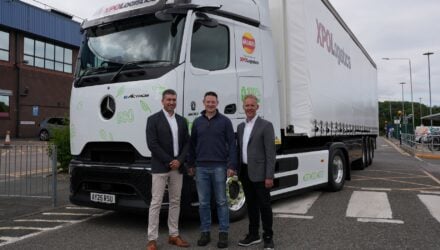The Highland Council has revealed significant cost and emissions savings by adopting an innovative new business travel strategy that has seen the introduction of 35 Enterprise Car Club vehicles. This is already reducing the organisation’s reliance on the ‘grey fleet’ where employees use privately-owned cars for work journeys and recharge mileage.

(L-R): Councillor Allan Henderson, Chair of the Highland Council’s Environment, Development & Infrastructure Committee, Keith Masson, Climate Change Officer, Highland Council, Keith Stark, Scotland Manager, Enterprise Car Club, Murray McAdam, Business Rental Sales Executive, Enterprise Rent-A-Car
In the six months between September and February 2019, the council saw average business road travel costs decrease by around a third (comparing the cost per mile of the car club to its grey fleet mileage reimbursement cost). The council estimates that by transferring grey fleet mileage onto the car club it has also already reduced its carbon footprint by approximately 50 tCO2e (estimated tonnes of carbon dioxide equivalent).
The Highland Council, which covers a region of Scotland that is roughly the size of Belgium, faced a significant grey fleet issue as many of its 10,000 employees have to travel large distances to and from around 70 local offices, schools and depots to deliver vital local services. When it began a review of travel 18 months ago, its grey fleet mileage was more than six million miles a year, at a cost of more than £2.2 million per annum.
Following the in-depth review, including partnering with Enterprise to analyse employee mileage in detail to determine how employees travelled and which offices needed dedicated vehicles based on-site, it is now running 26 dedicated car club vehicles from Enterprise. Car club technology has also been installed in nine of the council’s own pool cars.
The fleet includes four Nissan LEAF electric cars and the council is in the process of procuring additional plug-in hybrid and electric vehicles through the Switched-On Fleets initiative. Enterprise technology will be installed with a view to further reducing its carbon footprint as well as operational costs.
The Enterprise vehicles are booked and accessed online or via a mobile app and recharged to services at an hourly rate plus pence-per-mile, which for many journeys demonstrates better value than that of grey fleet reimbursement. It encourages both managers and drivers to be more thoughtful in how they manage their business travel and to avoid unnecessary trips.
Overall, the Highland Council estimates that its review of staff travel, including switching to Enterprise Car Club, will reduce its annual grey fleet mileage by around 1.2 million miles over the course of 2018-19. Alongside, the council is reducing non-essential business travel, rolling-out an improved ICT infrastructure to encourage video conferencing and focusing on shared and public transport for service delivery where practical. It is also considering introducing Enterprise Car Club vans.
Councillor Allan Henderson, Chair of the Highland Council’s Environment, Development & Infrastructure Committee, said: “Our service delivery used to be hugely reliant on the grey fleet. While it was convenient from an employee perspective, it meant we had little or no control over what types of personal cars our employees were driving, whether they were fit for purpose, modern and safe for the journey. Keeping on top of whether our 3,200 grey fleet drivers always had the correct level of business insurance was also a challenge.
“In addition, many staff were in bigger vehicles such as 4x4s due to the conditions in the Highlands, and so in many cases the mileage reimbursement rate barely covered their travel expenses and depreciation. Introducing Enterprise Car Club has been a hugely popular innovation for our employees, and it has also enabled us to control costs and reduce our carbon footprint.
“A comprehensive new approach to travel, underpinned by Enterprise’s car club, has transformed our business travel. Our staff can book and take the cars they need, either beforehand or on the day, and many no longer have to drive to work – so can walk, cycle or use public transport instead.
“It also means we now have control over all the previously unmanaged elements of business travel. We know employees are in safe, low-emission, well-maintained cars and can use the wealth of data provided by Enterprise to keep finding efficiencies and improving how, where and when our people drive for business. We can keep providing important local services and do so in a more cost-effective and sustainable way.”
Oz Choudhri, Head of Public Sector at Enterprise, said: “This is an excellent example of how switching from grey fleet into a car club delivers immediate results. Imagine if businesses up and down the country were saving the equivalent of almost seven tonnes of CO2 every month as a result of driving cleaner, more sustainable vehicles for business trips?
“The grey fleet is a significant issue for both public and private sector organisations from several perspectives: cost, duty of care, liability and sustainability. A dedicated car club addresses all of these issues and is an increasingly effective option for employee travel.
“The Highland Council’s analytical approach to improving provision for business travel is a major factor in the immediate success of the car club. Combined with wider policies to reduce costs and emissions, such as technology to replace face to face meetings and a new travel policy, the council has ensured a managed and progressive approach to business mobility. It’s an excellent example of how there are clear alternatives to the grey fleet that can yield immediate benefit.”






